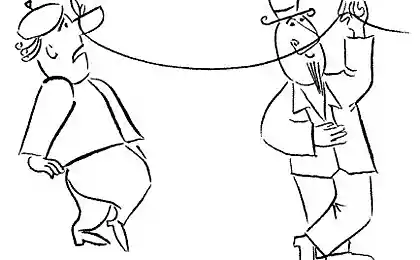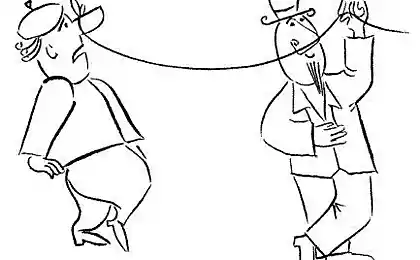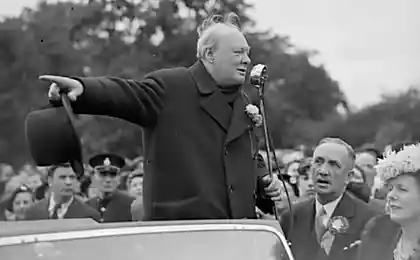718
20 interesting facts about the origin of the popular expressions and proverbs

Many familiar and sonorous phrases that we say in everyday speech, it turns out, have their own history! These stories are very interesting, and besides, tell little-known details of our past. < Website published a very "tasty" collection, which was highly appreciated by lovers of Russian language and expressions hlёstkih.
1. What is the right age to consider Balzac? H3> The expression "Balzac Age" emerged after the Balzac novel "The Thirty Years 'woman' and admissible against women no older than 40 years.
2. Where did the phrase "A healthy body - healthy spirit»? H3> The phrase "A healthy body - healthy spirit" was originally taken from the satire of the Roman writer Juvenal and sounded like this: "We must pray to the gods, to the spirit of healthy was in the body of a healthy" . It is believed that the basis of this line is known in ancient Rome, saying: "mens sana in corpore sano - a rare phenomenon».
3. How do the Swedes called buffet and a wall? H3> Buffet Swedes themselves are called snack or sandwich. The term referred to in the Swedish wall bars, translated as "frame with slats." Nothing is known in this country and the Swedish family - the belief that the Swedes are much more likely other people are practicing joint cohabitation of three or more people is a fallacy.
4. What phrase Sherlock Holmes never said? H3> The phrase "Elementary, my dear Watson!", Which we used to associate with Sherlock Holmes, never found in the original books of Arthur Conan Doyle. It came up in one of the theater based on the books about Holmes, from the phrase migrated to the movies. Most likely, the source of the phrase became a detective answer one word «Elementary» in "The Hunchback" - the only case of pronouncing the word Holmes for the whole bibliography.
5. What expression originated from the decree to brand the foreheads of criminals? H3> More from the 14th century in Russia, a practice of branding foreheads and cheeks criminals. From here are the origin of many popular expressions "written on my forehead," "denounce" and "seasoned web culprit».
6. Where did the word tyutelka? H3> Tyutelka - a diminutive of dialect Sissy ("hit, hit"), the name of the exact hit with an ax in the same place at the carpentry work. Today, to indicate precision used the phrase "on the nose».
7. Where did the expression "big shot»? H3> most experienced and strong Burlacu, going to the first strap, called bump. It turned into an expression of "big shot" to refer to an important person.
8. Where did the expression "the seven Fridays of the week»? H3> Before Friday was a free day from work and, as a consequence, market. On Friday, receiving goods, promised the next market day relying give him money. Since then, to refer to people who do not fulfill the promise, saying: "He has seven Fridays in the week».
9. Where did the expression "hack to death on your nose" and "stay with the nose»? H3> Before the nose in addition to the face called a tag, worn with them and that puts notches for accounting work, debt, etc. N. With this arose expression "Nick down". In another sense the nose called bribe offering. The expression "to remain with the nose 'meant to leave an offering of inaction, not agreeing.
10. Where did the term "cowboy firm»? H3> The possessive adjective "cowboy" was formed from the dialect Sharani ("scum, rabble, swindlers"). The expression "cowboy firm" first meant literally "the establishment, the organization of crooks, liars," and today is used to refer to a disreputable office.
11. Where did the expression "to play on the nerves»? H3> When the ancient doctors discovered the value of the nerves in the human body, they called on their similarity with the strings of musical instruments with the same word - nervus. Hence arose the expression for the irritant effect - "to play on the nerves».
12. Where did the expression "out of place»? H3> In French "aset" - this dish, and mood state. Presumably, an erroneous translation of the French expression was the cause of phraseologism "at ease».
13. Where did the expression "a moribund»? H3> According to Christian tradition, the man who had long to live, the priest confessed, communion and censers of incense. As a result, to refer to the disease a person or barely working devices fixed to the expression "moribund».
14. Where did the term "wash up bones»? H3> The Orthodox Greeks, as well as some of the Slavic peoples it was the custom of secondary burial - the bones of the deceased were removed, washed with water and wine and laid back. If the corpse found neistlevshim and swollen, which meant that during the life of this man was a sinner, and on it is a curse - go out at night from the grave as a vampire, vampire, vampire and destroy people. Thus, the rite of rumor-mongering was needed to ensure that no such spell. Today, the term "wash up bones" refers to the analysis of a person's character.
15. Where did the expression "to wash hands»? H3> In the Gospel legend, Pontius Pilate, who was forced to agree to the execution of Jesus, washed his hands before the crowd according to the commandments of Moses, and said, "I am innocent of this man's blood." Hence the expression to absolve themselves of responsibility, "I wash my hands».
16. Where did the term "scapegoat»? H3> In the Hebrew rite, on the day of the remission of sins the high priest laid his hands on the head of a goat and thereby laid on him the sins of the people. Then led away the goat in the Judean desert and released. Hence the expression «scapegoat».
17. Where did the term "pip you to the language»? H3> A small bump on the horn tip of the tongue in birds, which helps them to peck food, called Pip. The growth of the tubercle can be a sign of illness. Hard pimples in the language of human pips named by analogy with these birds tubercles. According to superstitious notions, pip usually appears in false people. Hence, evil desire "pip you to the language».
18. Where did the term "money does not smell»? H3> When the son of the Roman emperor Vespasian rebuked him that he introduced a tax on public lavatories, the emperor showed him received from this tax money, and asked whether they smell. After receiving a negative response, Vespasian said: "But they - from the urine." Hence the expression "money does not smell».
19. Where did the expression "doubting Thomas»? H3> When the apostle Thomas spoke of the resurrection of the crucified Christ, he said: "... Unless I see in His hands the print of the nails, and put my finger into the wounds him and put my hand into his side, I will not believe. " Today, any person who is difficult to convince of anything called "Thomas unbelievers».
20. Where did the expression "piece de resistance»? H3> for the World Exhibition of 1889 in Paris was timed opening similar to nail the Eiffel Tower, which created a sensation. Since then, the language has become the expression "highlight of the program».
via muzey-factov.ru/tag/idioms
The Seven Habits of people who survived the dashing nineties
5 little-known facts about Sergei Corded























